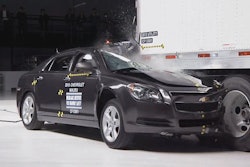The latest iteration of the House Transportation and Infrastructure Committee met for the first time on Wednesday with the goal of hearing from transportation-related industries about the current state of transportation infrastructure and supply chain challenges.
There were five industry representatives at the hearing representing trucking, rail, ports, construction and labor unions. Representing trucking was American Trucking Associations President and CEO Chris Spear.
Spear touched on a number of challenges trucking is currently facing, including highway congestion, truck parking, the driver shortage, independent contractor classification, the push to zero-emissions trucks and more.
Spear began his opening remarks talking about the $1.2 trillion 2021 Infrastructure Investment and Jobs Act (IIJA), also known as the Bipartisan Infrastructure Law (BIL), noting that even though the trucking industry makes up just 4% of vehicles on the nation’s roads, it “pays nearly half the tab into the Highway Trust Fund.” He urged the committee to make sure “every dollar be spent wisely.”
He said ATA objected to a December 2021-issued memo by the Federal Highway Administration that prioritized IIJA money to be spent on existing roads and bridges, rather than new construction. “Not only does this directly conflict with Congressional intent, it does nothing to address congestion, improve safety, and reduce emissions,” he said. He cited statistics that show the trucking industry loses nearly $75 billion a year sitting in congestion and burns $34 billion worth of fuel. “Fudning existing infrastructure alone does nothing to fix congestion, it just makes it worse,” he added.
Spear cited the annual Top 100 Truck Bottlenecks list – the updated version of which will be released next week, he said – as a good starting point for determining which areas need the most attention to improve the movement of freight in the U.S.
Spear also mentioned truck parking in his opening remarks, noting that trucking needs “new, secure truck parking capacity as proposed by bipartisan Truck Parking Safety Improvement Act.”










